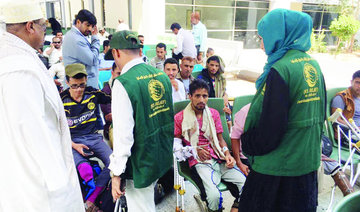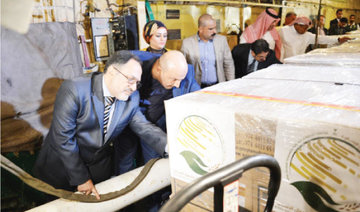MOSCOW: Saudi Arabia is at the forefront of the international community in terms of share of gross domestic product (GDP) earmarked for humanitarian aid, and a world leader in absolute volumes.
The King Salman Center for Humanitarian Aid and Relief (KSRelief) was one of King Salman’s first initiatives when he came to power. Despite being relatively new, it is already playing a significant role in providing humanitarian aid in many countries.
KSRelief currently operates, in conjunction with 28 international and local partners, 28 food-security and shelter projects benefitting almost 18 million people in eight countries: Albania, Kyrgyzstan, Mauritania, Somalia, Iraq, Zambia, Yemen and Tajikistan.
In Yemen, KSRelief operates 21 humanitarian aid delivery projects benefitting 27.5 million people, involving 11 international and local partners. It also operates 33 medical aid projects benefitting 16.6 million people in Yemen and Yemeni refugees in Djibouti, involving 40 international and local partners.
The head of KSRelief, Dr. Abdullah Al-Rabeeah, visited Moscow on April 17-18 for top-level talks and meetings with Russia’s government. In this interview, he spoke about the visit’s outcome, KSRelief’s activities and the situation in Yemen.
Q: It is your second trip to Moscow, but the first as head of KSRelief. What has your trip achieved, and what are the future prospects for humanitarian cooperation with Russia?
A: I am happy to say that this was a very productive visit, and I am very optimistic about its outcomes. There is a very clear willingness on the Russian side, and I am sure on the Saudi side, to build strong relations in the humanitarian field with emphasis on exchanging information, building capacity, learning from each other’s expertise, and hopefully launching joint programs. I sensed from this visit that there is interest from the Foreign Ministry, the Ministry of Civil Defense and Disaster Management, and the State Duma to strengthen Saudi-Russian relations. I am sure this reflects the intentions of both governments. Coordination, training and capacity-building are important. Maybe some of our staff can go to Russia and benefit from the experience of the Ministry of Emergency, and maybe Russian staff can join us and see how we work. Building relations with Russian non-governmental organizations (NGOs) is important because we have partners from all over the world, and we would like Russian partners also.
Q: How much of a priority is humanitarian aid to the Kingdom?
A: King Salman, when he was governor of Riyadh, personally supported humanitarian communities and programs worldwide. He is known to be involved in charity, relief activities and humanitarian work. So it was no surprise that one of his first initiatives was to establish KSRelief and streamline the work of the humanitarian community. The fact that a minister was appointed to lead the Center shows that this is a top priority for King Salman. For the last two or three decades, Saudi Arabia has been among the biggest donors, and in 2014 we had the highest share of a country’s GDP donated. We continue to invest a good part of our GDP to reduce human suffering worldwide.
Q: The international media’s criticisms of Saudi involvement in Yemen is often picked up by Russian media. But the media turns a blind eye to the Kingdom’s extraordinary humanitarian efforts worldwide. Why?
A: Saudi Arabia’s extraordinary efforts answer your question; not only such efforts, but also investments in humanitarian and relief work, and the development of Yemen. This shows that we have no intention to harm the Yemeni people. The Saudi intention is to help them, deliver aid to those in need, help the country develop and build systems to ensure safety and prosperity. Before the conflict, Yemen was suffering from major shortages of infrastructure and health, education and many other important social programs. The conflict is evidence that the militias did not want to see the will of the Yemeni people. They violated their decision by going against the government democratically elected by the Yemeni people. They also violated international law and the Gulf Cooperation Council (GCC) initiative. Saudi Arabia and other GCC countries are trying to provide food, development and safety to Yemen.
Q: The UN in February appealed to the international community to raise $2.1 billion for Yemen. Has Saudi Arabia contributed to this initiative, and what are the prospects for accumulating such a sum of money?
A: In 2015, the UN pledge was $274 million, and Saudi Arabia covered the whole pledge. That tells you how much we are supporting Yemen. Not only that, we doubled the pledge in terms of direct Saudi aid to Yemen. We would like to encourage the international community through Arab News to really support the Yemeni people by responding to the UN’s request, and to do so with evidence, not just in the media. Our critics should better demonstrate real support for the Yemeni people instead of attacking their biggest sponsor.
Q: Even if the funds are raised, there are still many obstacles to delivering humanitarian aid. How can they be avoided?
A: There is no work without challenges. When you work in conflict zones there are challenges of access. This is not only happening in Yemen but also in Syria. Relief organizations should not just stand still when there is a risk or challenge. In Yemen, the militias have imposed blockades and duties on aid, and confiscated and sold it to gain money to fight the Yemeni people. They also stop land convoys from Saudi Arabia. On the other hand, the Saudi-led coalition facilitates aid deliveries. It has secured the arrival of 6,163 sea, land and air convoys. It also facilitates access to the UN and international NGOs. We ask those creating sieges to think about human lives, give them priority and respond to international calls and humanitarian law.
Q: Is it important for the international community, including Russia, to work more closely with the coalition rather than just make statements?
A: We would love to see the international community put pressure and bring peace to Yemen according to UN resolutions, national dialogue, the will of Yemenis and the GCC initiative. It will not only help Yemen, Saudi Arabia and other GCC countries, but also the international community. Yemen will harbor more terrorists unless the conflict ends. Without a legitimate government, safety and security, and without disarming the militias and terrorists, you will not have a safe world. The coalition not only brings safety to Yemen, but also to the international community. For example, due to the chaos caused by the militias, Al-Mukalla became an Al-Qaeda base. So the coalition and Yemen’s army had to fight them and bring the government to safety. The coalition and Yemeni army are also fighting Daesh in many locations. We would like the international community to see the bigger picture.
Q: What projects will KSRelief be developing in the future?
A: We have very important programs in Syria that are being carried out as we speak. We have programs in Iraq, and we are reviewing programs for internally displaced Iraqis and Syrian refugees in Iraq. We are active in Somalia due to conflict and drought there. We are studying programs for South Sudan. The UN has deemed South Sudan, Yemen, Somalia and Nigeria among the highest priorities. We have programs for other countries in Africa that are facing drought. We are present in 37 countries. I hope that in the coming months and years we will be able to find more partners, friendly countries that will work with us and ensure that we bring new dimensions for relief and humanity. Hopefully, with the help of international academic institutes, we will have innovative ways to increase the impact of aid for those in need.
























